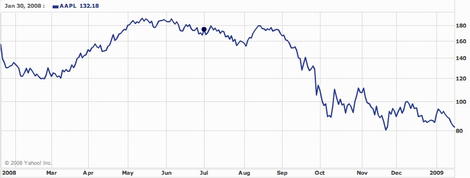Apple: Is the sky falling?

Apple stock keeps getting hammered on a daily basis, either from concerns about how the company weathered the drop in consumer spending during the holiday season, or from worries over the missing Steve Jobs. In advance of Apple's first quarter FY 2009 report on Wed., there were plenty of new postings to chew on (as the company's stock fell another 4 percent).
Fortune.com compared and contrasted reports by Bernstein Research’s Toni Sacconaghi (Apple is doomed) and Piper Jaffray’s Gene Munster (Apple rocks).
This theme continues throughout their reports. Sacconaghi sees “significant deterioration” in iPod sales from the NPD data. Munster believes “the segment’s outperformance relative to Street expectations is a positive.”
Both analysts see the iPhone as a wild card, expecting international sales to offset what Munster calls “headwinds” in the U.S. market. But NPD doesn’t provide data for cell phones, so the analysts were on their own.
Not surprising, their iPhone sales estimates are wildly divergent. Sacconaghi is calling for sales of 3.5 to 4 million units in the quarter that ended in December. Munster is sticking with his estimate of 6.4 million, but acknowledges that it might prove to be “aggressive.”
At Bullish Cross, Andy Zaky offers a long dose of analysis about how Apple's accounting in How the iPhone and Poor Apple Management have contributed to the Downfall of Apple. Of course, in his view, this "downfall" is the drop in Apple stock price over the past year.
The underlying problem with the subscription method of accounting is that it makes Apple's financials appear radically weaker than they actually are. And as any experienced market participant knows, the market rarely trades on reality. Stocks trade on appearances, they trade on fluff, they trade on generalities regarding the health of the economy—what they do not trade on, is reality regarding fundamentals. Especially if teasing out that reality requires anything more than looking beyond the surface.
This accounting treatment of the iPhone hides Apple's true financial value under the shroud of adjusted earnings to which almost no one seems to pay much attention. It puts Apple at a significantly uneven keel when compared to other similarly situated stocks in the sector. As a matter of fact, it is quite possible that Apple could be trading at $140 a share today if it never introduced the notion of subscription accounting.
Zaky said that the iPhone adoption rate would have been seen as a blow-out and "investor confidence would have both led to greater advances in Apple's stock price and put up some considerable support during the inevitable collapse in equities this past October of which almost no stock was immune."
At the same time, there's the continuing trope that Apple is doomed without Jobs. Of course, the question is posed in stories and headlines and then mostly answered with "yes." Duh!
For example:
Can Apple survive without Jobs? On the cover of last week's issue of Time.
I Really Should Study's Question of the Day: Can Apple Survive Without Steve Jobs?
There are hundreds of similar posts. Come on!
I had believed that this trope had run its course after the dog days of 1998 and the resurgence of Apple consumer products and the Macintosh in multiple market segments. Perhaps the big difference between now and a decade ago is that the answer back then from the mainstream financial press and PC-centric rags was that Apple indeed was doomed.
Besides, I've always been told that stock price is a "forward-looking indicator," meaning the outlook for the next 6 months. But the Apple Survivalists seem to have a longer outlook. Certainly, computer hardware (and even software) is not produced by magic elves on "Internet time." The plans for the Macs and iPods and iPhones that we will see over the next year or two have already been decided upon and given the Steve Jobs stamp of approval (if this really makes a difference).
Steve Wozniak reminded investors of this a recent interview, which was quoted at Mac.Blorge:
One of the biggest questions on the minds of investors, of course, has been whether or not Apple could continue to turn out winning technical products without Jobs at the helm. Wozniak had the following to say:
“The products coming out of Apple, out of tech companies, have a long tech pipeline…they work their way through for a year, year and a half…Those products are in the pipeline, they’re not going to be disturbed.” Wozniak obviously feels that Jobs’ six months leave of absence will not hurt the company greatly.
